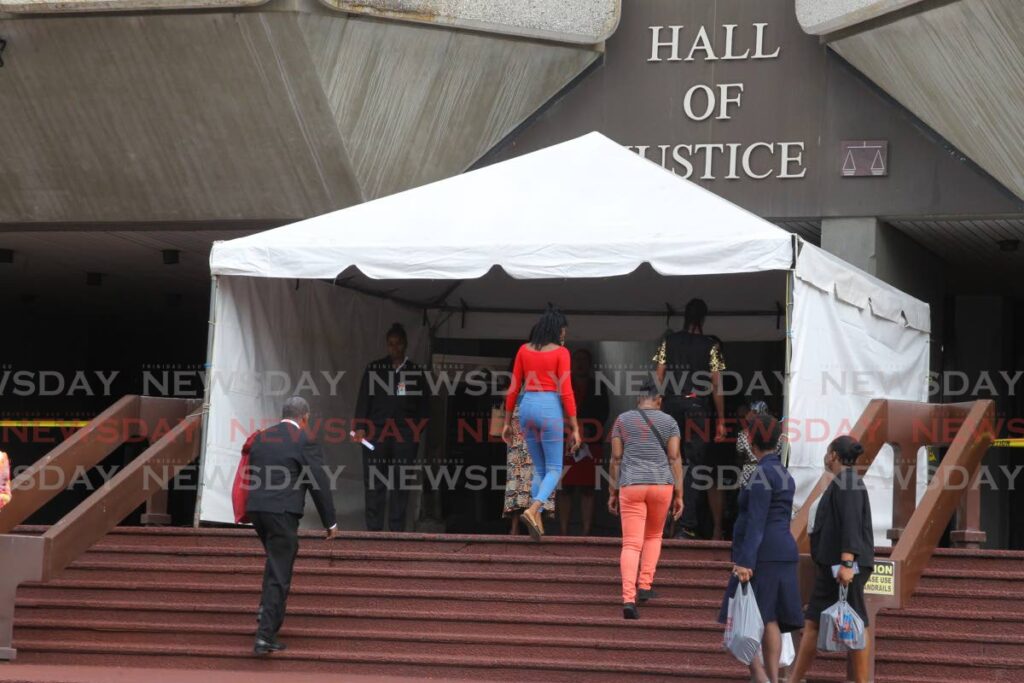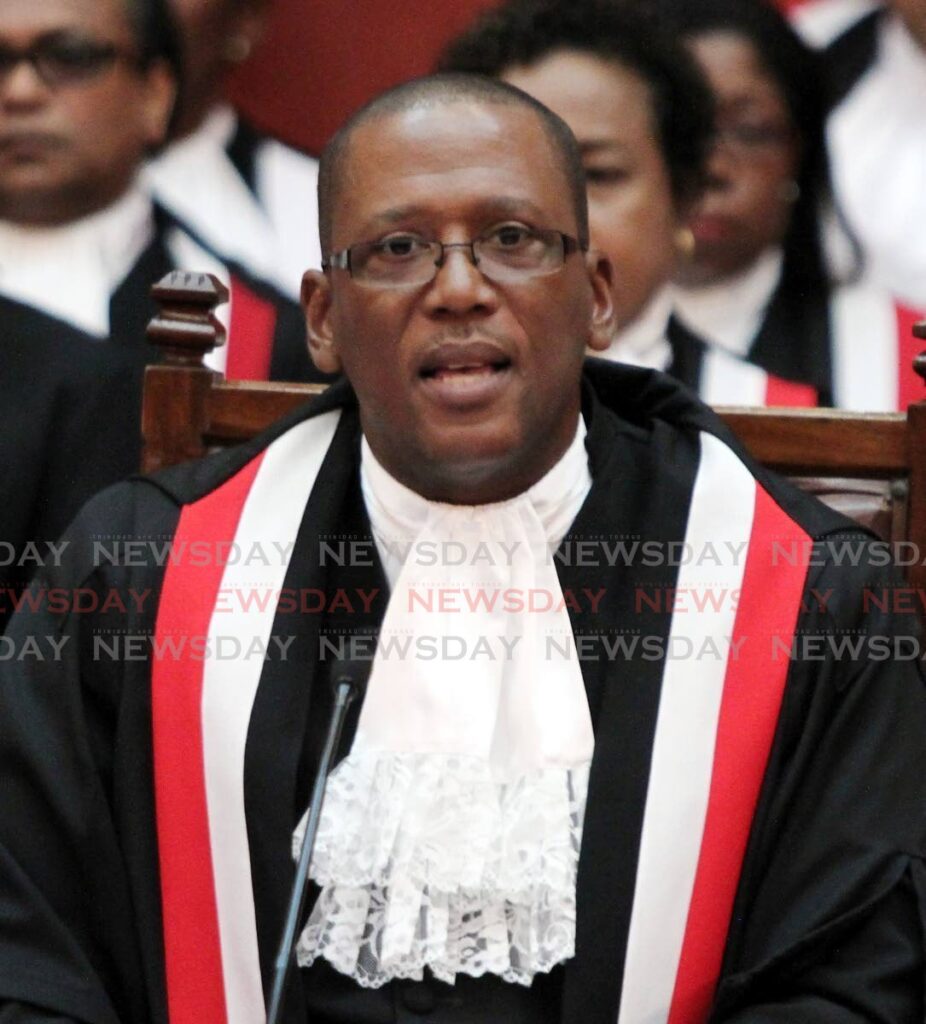[UPDATED] Jury trials to resume, stakeholders welcome in-person court

NEWS of a return to jury trials in the Supreme Court has been welcomed by stakeholders in the criminal justice system but it also raised questions on how it will be implemented during the pandemic.
Jury trials were halted two years ago as one of the measures to protect staff and other court users in March 2020 and in effect stalled the progress of cases of scores of remand inmates whose indictments are ready for trial.
Chief Justice Ivor Archie on Friday issued the latest practice directions for the Supreme Court and said jury trials were once more permissible but noted safety measures were paramount to protect jurors, court staff and other users from covid19.
The issue of the lack of jury trials has been raised as a matter of concern by Director of Public Prosecution (DPP) Roger Gaspard SC, the Law Association and even two judges recently.
Law Association president Sophia Chote said the council of the Law Association is currently reviewing the new court rules.
Commenting on the resumption of jury trials, Attorney General Faris Al-Rawi said it came as no surprise to him as the matter had been recently discussed by the Criminal Justice Sector Committee which comprises the Chief Justice, the DPP, the Public Defenders Department, the Law Association, the Commissioner of Police, the Commissioner of Prisons among others.
He said the decision is "harmonious" with the Prime Minister's announcement of the return to work for all public servants by March 7.
The AG said the reforms of the criminal justice system such as case management hearings, criminal procedure rules, the relocation of civil courts to the Port of Spain Waterfront Complex, the establishment of a criminal court in O'Meara were all aimed at clearing the backlog of criminal cases.
"We are now ready to run the hybrid systems," he said. He acknowledged the Prime Minister's recent comment about the slow pace of justice, saying, "We are all intimately aware that the justice system has many elements."
He said the issue of critical staff shortages at the Office of the DPP was a matter for the Judicial and Legal Service but noted new accommodation at Park Street, Port of Spain, commissioned in July 2020, for public prosecutors was almost ready once it gets clearance from Special Branch.
Gaspard, in a recent affidavit, said his office was operating with 46 attorneys, one-third of its approved complement of 137, and prosecutors now had the growing responsibility of all criminal cases in 39 magisterial courts, nine high courts, appeal courts, and bail applications, including those filed by people awaiting trial for murder.
Soon prosecutors will take over the conduct of all indictable matters, some of which are being prosecuted by the police, after the Administration of Justice (Indictable Proceedings) Act 2011 is proclaimed.
Chief Public Defender Hasine Shaikh said her staff of 25 "has been waiting for full trials to resume."
"We are ready," she said. The department which offers free legal services to people awaiting trial for criminal offences, including murder, was formed in early March 2020, and attorneys have only had the experience of appearing in virtual judge-alone trials and magisterial hearings.
The new practice directions create a "hybrid hearing" where some aspects will be virtual and some in-person. Prisoners will not be brought to court and they can follow proceedings via a live video feed from the jailhouse.
Courtrooms at the Hall of Justice and the San Fernando High Court have been outfitted with large screens and can broadcast live-streams linking prisoners and witnesses in various virtual access customer centres.
Judges have been operating remotely for the most part over the last two years and the only criminal trials which progressed were those where the accused opted for judge-alone trials.
According to the notice published in the TT Gazette, the new court operations will come into effect on Monday (March 14).
Registrars of the Supreme Court will now have to issue summonses for potential jurors to make up a pool for the criminal courts in Port of Spain, San Fernando and Tobago. Judges in the criminal division will also have to prioritise which criminal cases will be ready for jury trials.
The latest practice directions were issued after concerns were raised by at least two judges over the public's right to access courts after the Prime Minister relaxed the health regulations directing all public servants back to work. It also comes after the Prime Minister criticised the Judiciary over the slow pace of justice after pumping millions to provide resources.

In response to the judges' concerns, Archie said he was aware that some would like in-person hearings to resume and for staff to be in office each day. However, he said, “This must be balanced against the fact that over the past six months we have had 1,148 staff members on quarantine and as of this week we have 54 still in quarantine, 26 positives being monitored and six deaths.
“In those circumstances, we cannot have confidence that introducing staff into shared spaces such as rather cramped judges’ bays would not exacerbate the situation.”
While judicial officers retained control of the courtroom operations of each trial or hearing, which can be a mixture of in-person or virtual hearings, in the instance of "any jury trial" they must have due regard for the safety and health of members of the jury.
"No juror must be required to sit shoulder to shoulder with another person," the notice said.
Any juror who feels unwell or has been in close contact with a covid19 patient or a suspected case within seven days must inform the Registrar of the Supreme Court or the trial judge immediately.
"In addition, the name of any person be it a witness, attorney, or any other party, required to attend court must be submitted to judicial officers 48 hours in advance of the scheduled hearing."
The Judiciary said all documents will continue to be electronically filed including those relating to wills, bail and other matters.
This story has been updated with additional details. It was first published under the headline Chief Justice announces jury trials to resume
AFTER a two-year hiatus, jury trials are scheduled to return to the Supreme Court.
Chief Justice Ivor Archie on Friday issued the latest practice directions which creates a "hybrid hearing" but prisoners will not be brought to court.
According to notice published in the Trinidad and Tobago Gazette, the new court operations will come into effect on Monday (March 14).
Registrars of the Supreme Court will now have to issue summons for potential jurors to make up a pool for 12 criminal courts in Port of Spain (eight), San Fernando (three) and one in Tobago. Judges in the criminal division will also have to prioritise which criminal cases will be ready for jury trials.
The latest practice directions were issued after concerns were raised by at least two judges over the public's right to access courts after the Prime Minister relaxed the health regulations directing all public servants back to work. It also comes after the Prime Minister criticised the Judiciary over the slow pace of justice after pumping millions to provide resources.
In response to the judges' concerns, Archie said he was aware that some would like in-person hearings to resume and for staff to be in office each day. However, he said, “this must be balanced against the fact that over the past six months we have had 1,148 staff members on quarantine and as of this week we have 54 still in quarantine, 26 positives being monitored and six deaths.
“In those circumstances, we cannot have confidence that introducing staff into shared spaces such as rather cramped judges’ bays would not exacerbate the situation.”
While judicial officers retained control of the courtroom operations of each trial or hearing, which can be a mixture of in-person or virtual hearings, in the instance of "any jury trial" they must have due regard for the safety an health of members of the jury.
"No juror must be required to sit shoulder to shoulder with another person," the notice said.
Any juror who feels unwell or has been in close contact with a covid19 patient or a suspected case within seven days must inform the Registrar of the Supreme Court or the trial judge immediately.
"In addition, the name of any person be it a witness, attorney, or any other party, required to attend court must be submitted to judicial officers 48 hours in advance of the scheduled hearing.
The Judiciary said no documents will continue to be electronically filed including those relating to wills, bail and other matters.

Comments
"[UPDATED] Jury trials to resume, stakeholders welcome in-person court"